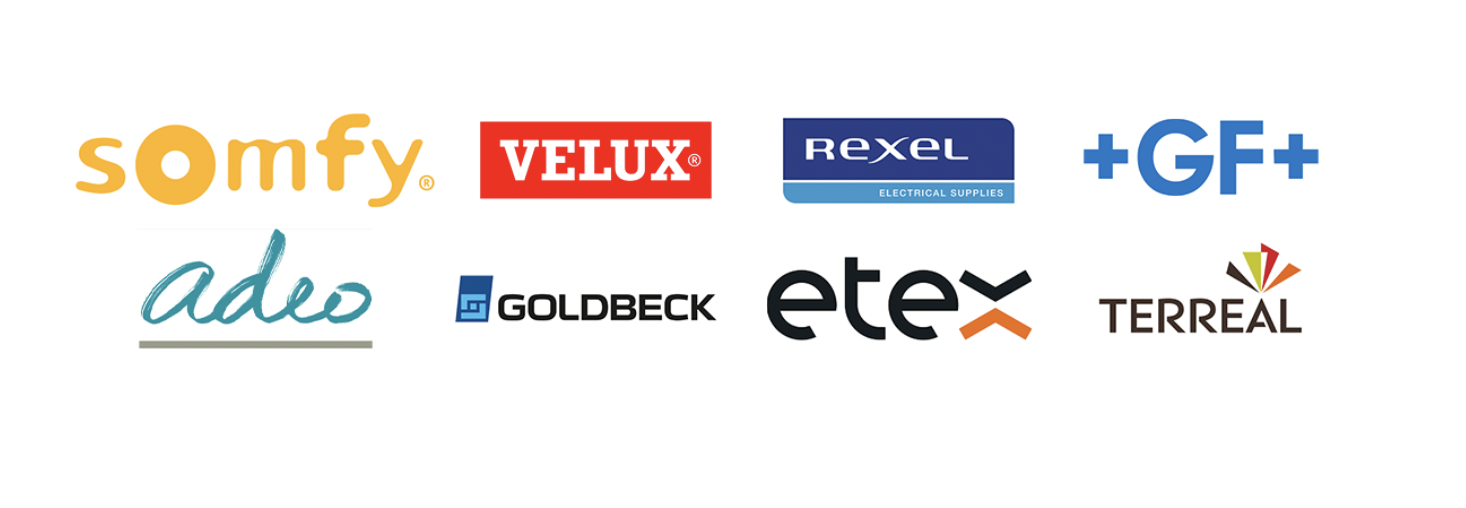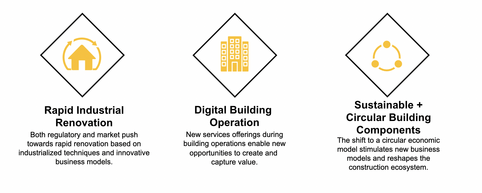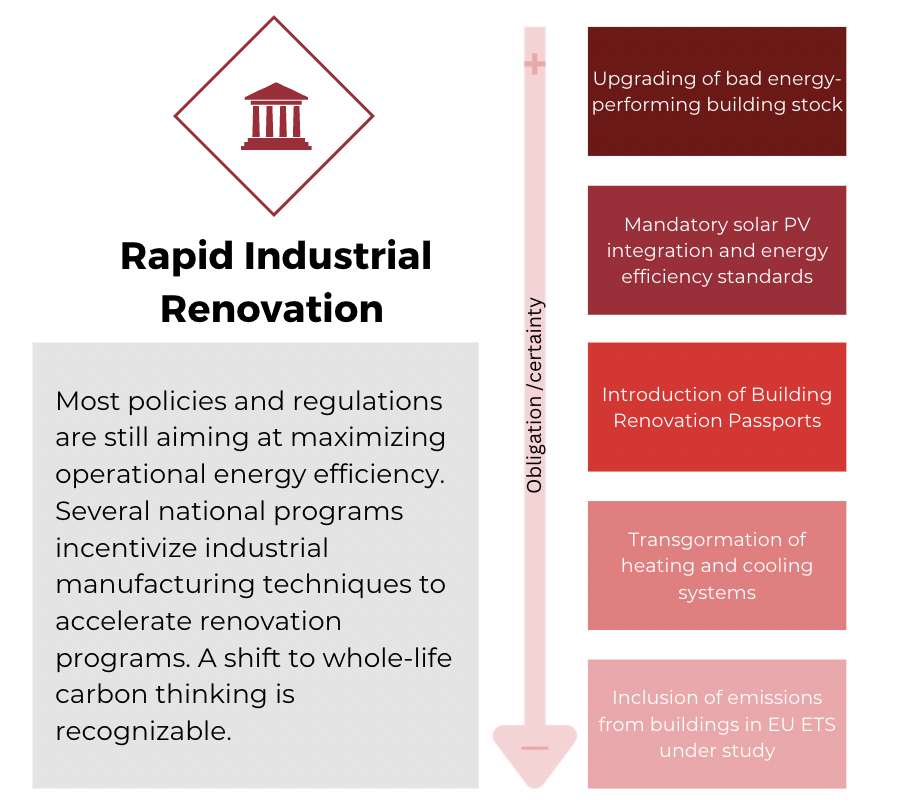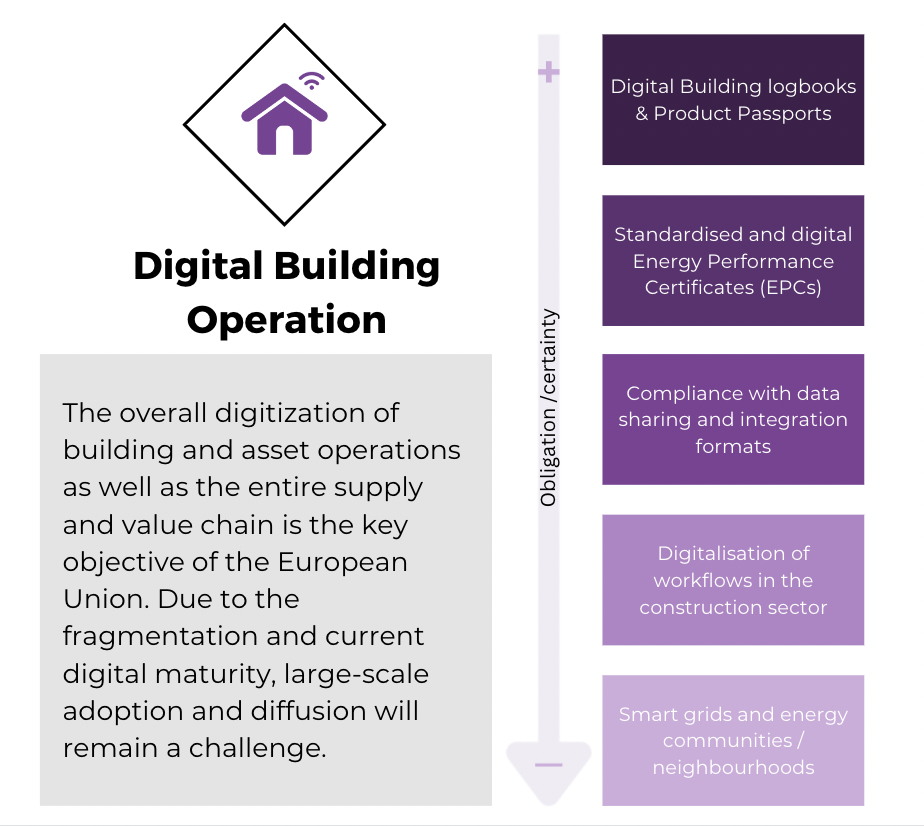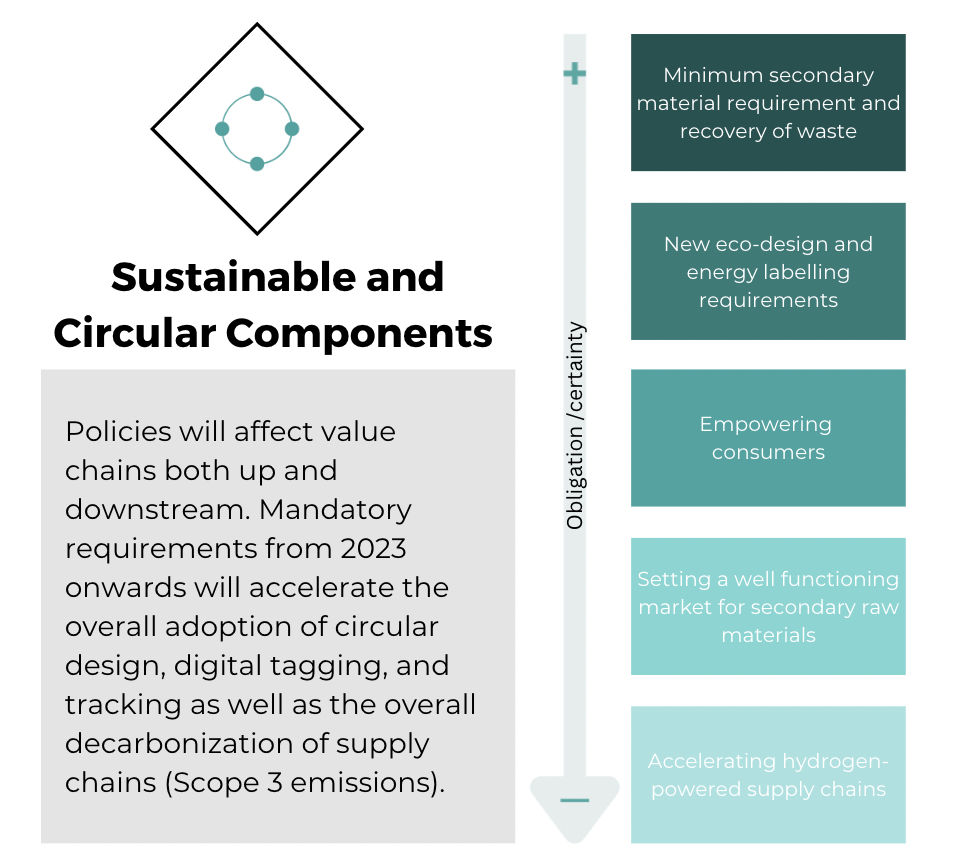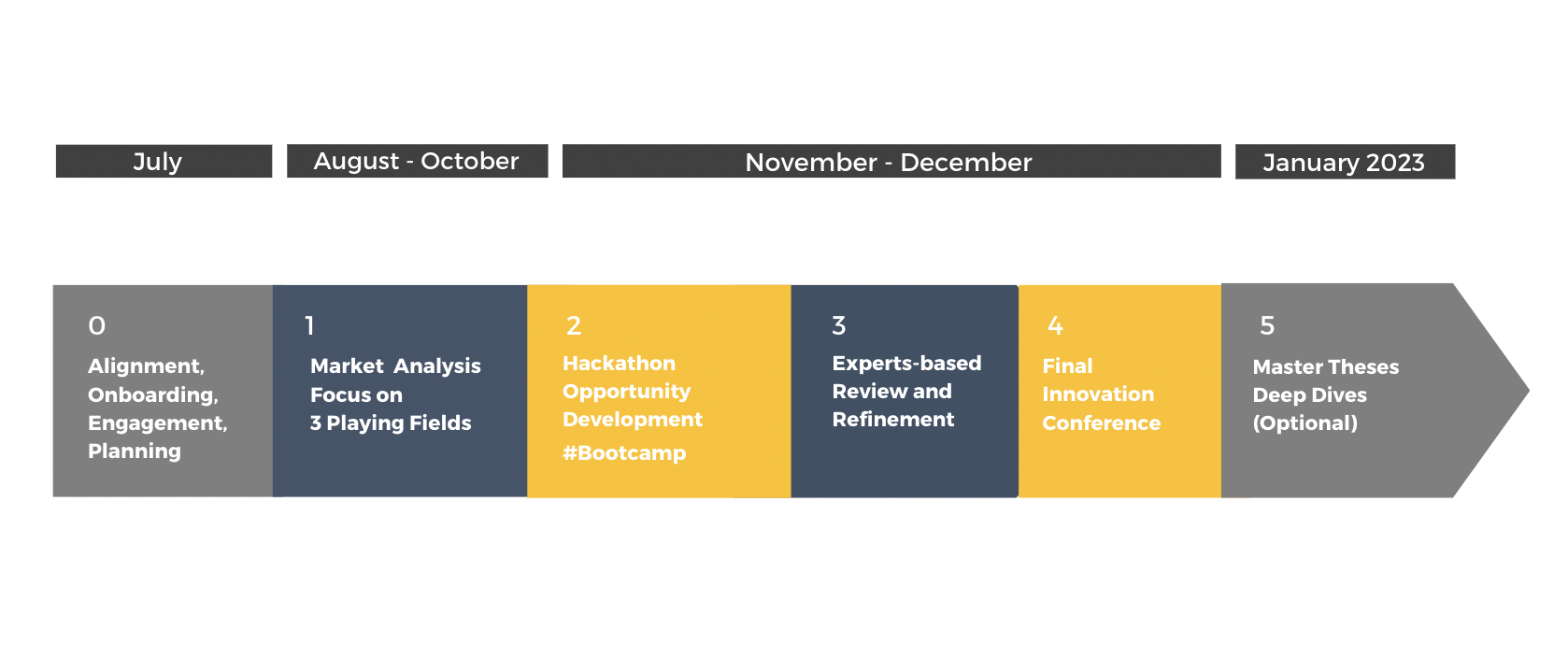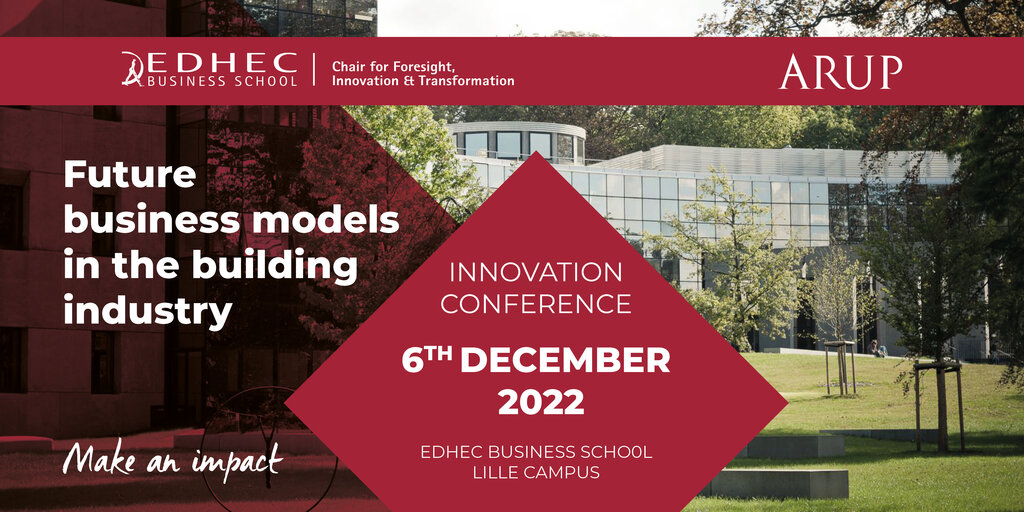Future of Buildings
Meeting the challenge of building renovation requires linking different business models along the value chain. The Chair, with ARUP at its side, is orchestrating a co-creation project bringing together industrialists and students on this subject.
NEW BUSINESS MODELS ARE PROMISING
THE CHALLENGE: To meet the COP26 climate agreement targets, solving the building renovation challenge is key
THE PROBLEM: Construction companies and real estate developers have not been sufficiently incentivised to prepare for the after-sales, renovation and end-of-life phases of buildings
THE OPPORTUNITY: Digitalisation, pre-fabricated systems, and off-site and industrialised assembly can significantly bring down renovation costs
THE DRIVERS: in Europe, five drivers will lead to transformational change in the building industry and ecosystems:
- EU Green Deal and ESG Taxonomy
- Circularity
- Talent Shortage
- Industrialisation
- Digitalisation
Meeting the renovation challenge will require connecting different business models along the value chain. The European Taxonomy of Sustainable Businesses encourages models that rely on digitalization (Gropyus), circularity (Concular), sustainable communities (Home.Earth), and renovation on an industrial scale (Ecoworks).
THE PROJECT
For two years, the project will bring together complementary and non-competitive industrial partners and final-year EDHEC students. This project is orchestrated by ARUP and the Foresight, Innovation & Transformation Chair.
- To learn more about the challenges associated with this project, read the April 2021 Linkedin article by René Rohrbeck: « Circularity, Industrialisation, Digitalisation: The perfect storm to revolutionise the buildings sector? »
2022 Partners
2021 Partners
THE OPPORTUNITY
MARKETING ANALYSIS OF THE THREE PLAYING FIELDS
-
Rapid Industrial Renovation
- Digital Building Operation
- Sustainable and Circular Components
THE PROJECT PROCESS OVERVIEW
3-Day Hackathon 2022
With 150 students from EDHEC Strategy, Organization, and Consulting Master program and 50 professionals from the building and construction industry, (Somfy, Velux, Rexel, Georg Fisher, Goldbeck, Etex, Adeo, and Terreal), EDHEC FIT Chair and ARUP organized the Future Business Models in Building Renovation Hackathon 2022 at EDHEC Jean-Arnault Campus.
- Five Challenges were scanned and developed by companies:
? Challenge 1. Holistic Services for sustainable single-family housing retrofit to homeowners – B2C
? Challenge 2. Holistic services or sustainable housing retrofit to homeowners – B2B
? Challenge 3. Realising the value of digital twins for office and industrial typologies B2B
? Challenge 4. Sustainable Offerings and Circular Value Chains: Reduce, Reuse, Repair – B2C
? Challenge 5. Sustainable Offerings and Circular Value Chains: Reduce, Reuse, Repair – B2B
- Objectives
The objective of this hackathon was to get EDHEC Strategy, Organization, and Consulting Master's students to work on 5 challenges scanned and developed by companies. 25 student teams performed in analysis of Actors, Value proposition, Distribution channel, Payment models, and Project management. They proposed innovative solutions for companies and new business models that meet the challenges encountered: digitalization of buildings, renovation requirements, new, more sustainable materials, and a sustainable circular economy.
- Takeaways
Watch the recap video to learn what about our students' and partners' takeaways from the Hackathon 2022.
Innovation Conference
On 6th December, we had the pleasure of welcoming partners from 8 different companies (Somfy, Velux, Rexel, Georg Fisher, Goldbeck, Etex, Adeo, and Terreal) from the building and construction industry, Michelle Sisto, the Associate Dean of Graduate Studies, and 150 students from the MSc in Strategy, Organization, and Consulting from EDHEC Business School for the Innovation Conference on the Lille campus.
To meet COP26 commitments and achieve 1.5 degrees Celsius global warming, following a great kick-off with a brief introduction of the Future Of Building project and inspirational keynotes from Martin Pejsa, the CEO of Creative Dock, we had partner workshops where all partners exchanged ideas and shared innovative practices to achieve future success.
During the Innovation Conference, 25 student teams contributed 5 creative pitches to 5 challenges from the hackathon. Moderated by Martin Pauli, the Global Circular Economy Service Associate Director of ARUP, an insightful panel made up of Martin Pejsa, Julien Neuschwander, Christopher Duehnen, and Simay Arikan discussed the importance of driving sustainability via the circular economy and shared their experiences and visions of the future of buildings.
Watch the replay of the Innovation Conference on YouTube to learn more.
Watch the recap video to know more about our recommendations.
THE DELIVERABLES
Participants jointly create an overview of business model archetypes, anticipate future business models, and examine strategic opportunities in depth.
BUSINESS MODEL PLAYBOOK
Overview of archetypes of business models for building sector – including a deep dive with student teams into a case for every business model.
BUSINESS MODEL ARCHETYPE AND IDEATION WORKSHOPS
Interactive workshops and post-processing documents.
BUSINESS MODEL DEVELOPMENT AND WIND TUNNELING
Working with student teams to investigate new business opportunities.
JOIN THE FIT CHAIR
The core partners define project priorities and jointly finance a comprehensive foresight study that identifies business opportunities across the industry. There are two options to fund your contribution to the ‘Future Business Models in Building Renovation’ project; through a donation or via a signed agreement. If you are interested in joining the Future of Buildings 2.0 Project, contact Alix LA COTTE:

